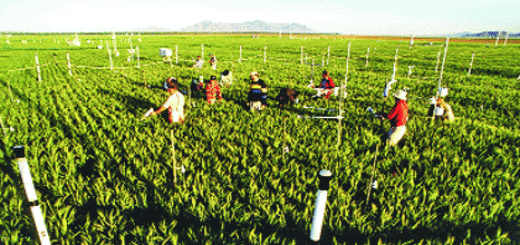Breathing Dirty Air May Boost Obesity Risk
Air pollution is bad for our lungs. It may not be great for our waistlines either, a new study in rats finds.
China’s capital city of Beijing has some of the worst air pollution in the world. On really bad days, its air can host more than 10 times as many tiny pollutant particles as the World Health Organization says is safe for human health. In a new study, rats breathed in this air. And those rodents gained more weight, and were unhealthier overall, than were rats breathing much cleaner air. The results suggest that exposure to air pollution can raise the risk of becoming extremely overweight.
And, adds Loren Wold, “It is highly likely that this is happening in humans.”
Wold works at Ohio State University in Columbus. There, he studies how air pollution affects the heart. He was not involved in the new study. But he says it agrees with many other studies that have suggested air pollution can affect metabolism, which is how the body breaks down food and uses it for fuel.
Polluted air contains particles of ash, dust and other chemicals. Sometimes these particles are so numerous that they create a thick, dense smog can cuts visibility.
Earlier experiments among 18-year olds in Southern California had linked heavier traffic with higher body mass index (a measure of overweight and obesity). Areas with heavy traffic also tend to have more of those pollutant particles. Another study found that when pregnant mice were exposed to exhaust from diesel engines, their pups grew up to be heavier. The pups also developed more inflammation in their brains.
In the new study, researchers tested how Beijing’s polluted air affects the health of pregnant rats.
Jim Zhang is an environmental scientist at Duke University in Durham, N.C. He and his co-workers put rats in two indoor chambers in Beijing. They piped polluted air from the city directly into one chamber. Air piped into the other chamber went through a filter. That filter removed almost all of the big pollution particles from the air and about two-thirds of the smaller ones. This made the air more like what people breathe in typical U.S. cities and suburbs, Zhang says.
All rats ate the same type and amount of food. But after 19 days, the pregnant rats breathing the heavily polluted air weighed more than the rats breathing the filtered air. They also had higher amounts of cholesterol — a waxy, fatlike substance — in their blood than did the rats breathing filtered air.
Those breathing the dirtier air had higher levels of inflammation. This is a sign of the body responding to tissue damage. These rats also had higher insulin resistance. This means their bodies weren’t responding as well to insulin, a hormone that helps with using sugar for energy. Insulin resistance can lead to diabetes, a dangerous health condition.
Taken together, the scientists say, these symptoms indicate the rats were developing metabolic syndrome. It’s a condition that puts the animals at risk of heart disease and diabetes.
During the experiment, the pregnant rats gave birth. Their pups stayed in the chambers with their mothers. And young rats that breathed in the polluted air were heavier than pups born to moms living in the cleaner air. Like their moms, the pups breathing much polluted air had more inflammation and insulin resistance.
The longer these pups breathed the dirty air, Zhang says, the unhealthier they became. This suggests that breathing polluted air for a long time can lead to sickness, Zhang says.
It’s not yet clear exactly how air pollution affects rat metabolism. But it seems, Zhang says, to impair how the animals process fat and sugar. Pollution also increases signs of inflammation in the lungs, blood and fat. Zhang says this is probably what led to weight gain in the animals.
Wold says it might be possible to create medicines that reverse the negative health effects of air pollution. But these medicines will take time to develop.
Until then, Zhang and Wold say that paying attention to air pollution levels can help people manage their health risks. On days when pollution levels are high, they recommend that people stay indoors, if possible — or at least avoid tough outdoor exercise. n















Recent Comments